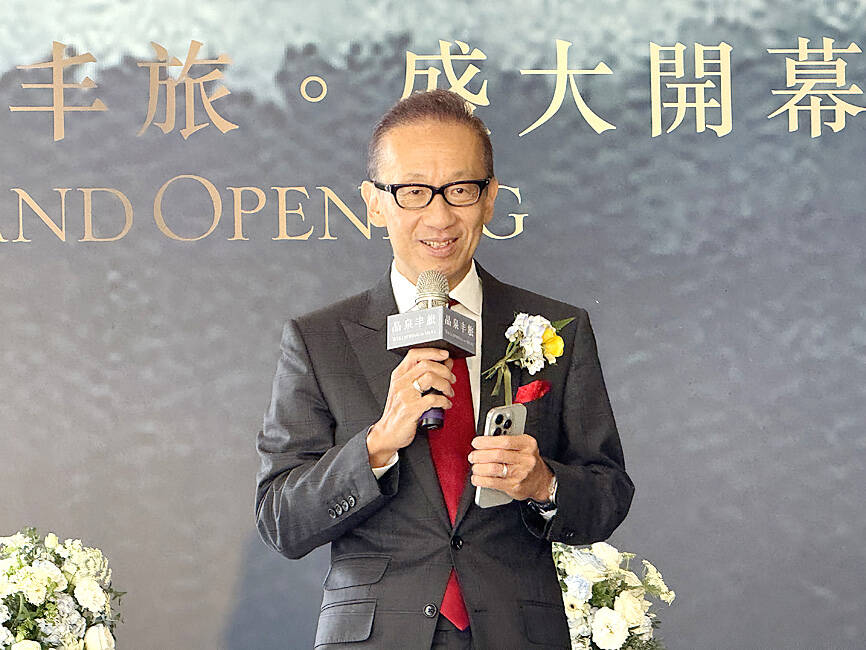Taiwan’s hotels are taking an indirect hit from US tariff challenges, but hopefully the negative impact would prove short-lived, as the US and its trade partners iron out their differences, Formosa International Hotels Corp chairman Steven Pan (潘思亮) said yesterday.
Pan, whose company operates hotels under the brands Regent Taipei (台北晶華酒店), Silks Place (晶英酒店), Just Sleep (捷絲旅) and Wellspring by Silks (晶泉丰旅), made the comments at the grand opening of Wellspring by Silks Beitou (北投晶泉丰旅).
“Tourism, while driven by domestic demand, is closely tied to the broader economy,” Pan said. “If the economy flounders, the hospitality industry cannot remain unaffected.”

Photo: CNA
Concerns about a potential economic downturn are mounting, as global markets reel from escalating tariff tensions linked to US changes in trade policies, he said.
The global economic landscape looks murky and fluid at present, but with US financial markets showing signs of stabilization, the worst could soon be over, he said.
Pan called the coming three months “critical” after US President Donald Trump announced a 90-day moratorium on “reciprocal” tariffs.
Failure by the US and its trade partners to achieve clarity during this period could push the global economy into a slump, with far-reaching effects on industries focused on manufacturing, as well as tourism and services, he said.
While manufacturers would bear the brunt of tariffs, service-oriented industries would also suffer due to frail consumer confidence, Pan said.
The global economy has long been underpinned by US consumer demand, but the burden might shift to other countries, in light of Trump’s drastic policy changes, he said.
China, where Pan has business interests through the Regent brand, is most vulnerable to tariff-related shocks, as the US has more than doubled its tariff burden, he said.
The impact on China would be very, very significant, he added.
By contrast, Taiwan could turn the ongoing turbulence into an opportunity by repositioning itself within global supply chains, he said.
“Taiwan now plays a role in tech similar to what Hong Kong once was in finance,” he said, suggesting that the country could benefit from closer alignment with US technology moguls.
If Taiwan could navigate the uncertainty with prowess, it might emerge more integrated and influential in the global economy, Pan said.
Still, Pan has a positive outlook for Taiwan’s tourism sector, aided by the country’s rich tourism resources and steady travel demand.
Wellspring by Silks Beitou (北投晶泉丰旅), for instance, reported an average occupancy rate of 75 percent after its soft opening, higher than an estimated 60 percent, he said.
However, Pan voiced grave concern over a persistent labor shortage in the hospitality industry, describing the issue as a “national security-level” crisis.
He urged the government to develop effective workforce policies to support the sector’s sustainable growth.

On Ireland’s blustery western seaboard, researchers are gleefully flying giant kites — not for fun, but in the hope of generating renewable electricity and sparking a “revolution” in wind energy. “We use a kite to capture the wind and a generator at the bottom of it that captures the power,” said Padraic Doherty of Kitepower, the Dutch firm behind the venture. At its test site in operation since September 2023 near the small town of Bangor Erris, the team transports the vast 60-square-meter kite from a hangar across the lunar-like bogland to a generator. The kite is then attached by a

Foxconn Technology Co (鴻準精密), a metal casing supplier owned by Hon Hai Precision Industry Co (鴻海精密), yesterday announced plans to invest US$1 billion in the US over the next decade as part of its business transformation strategy. The Apple Inc supplier said in a statement that its board approved the investment on Thursday, as part of a transformation strategy focused on precision mold development, smart manufacturing, robotics and advanced automation. The strategy would have a strong emphasis on artificial intelligence (AI), the company added. The company said it aims to build a flexible, intelligent production ecosystem to boost competitiveness and sustainability. Foxconn

Leading Taiwanese bicycle brands Giant Manufacturing Co (巨大機械) and Merida Industry Co (美利達工業) on Sunday said that they have adopted measures to mitigate the impact of the tariff policies of US President Donald Trump’s administration. The US announced at the beginning of this month that it would impose a 20 percent tariff on imported goods made in Taiwan, effective on Thursday last week. The tariff would be added to other pre-existing most-favored-nation duties and industry-specific trade remedy levy, which would bring the overall tariff on Taiwan-made bicycles to between 25.5 percent and 31 percent. However, Giant did not seem too perturbed by the

TARIFF CONCERNS: Semiconductor suppliers are tempering expectations for the traditionally strong third quarter, citing US tariff uncertainty and a stronger NT dollar Several Taiwanese semiconductor suppliers are taking a cautious view of the third quarter — typically a peak season for the industry — citing uncertainty over US tariffs and the stronger New Taiwan dollar. Smartphone chip designer MediaTek Inc (聯發科技) said that customers accelerated orders in the first half of the year to avoid potential tariffs threatened by US President Donald Trump’s administration. As a result, it anticipates weaker-than-usual peak-season demand in the third quarter. The US tariff plan, announced on April 2, initially proposed a 32 percent duty on Taiwanese goods. Its implementation was postponed by 90 days to July 9, then